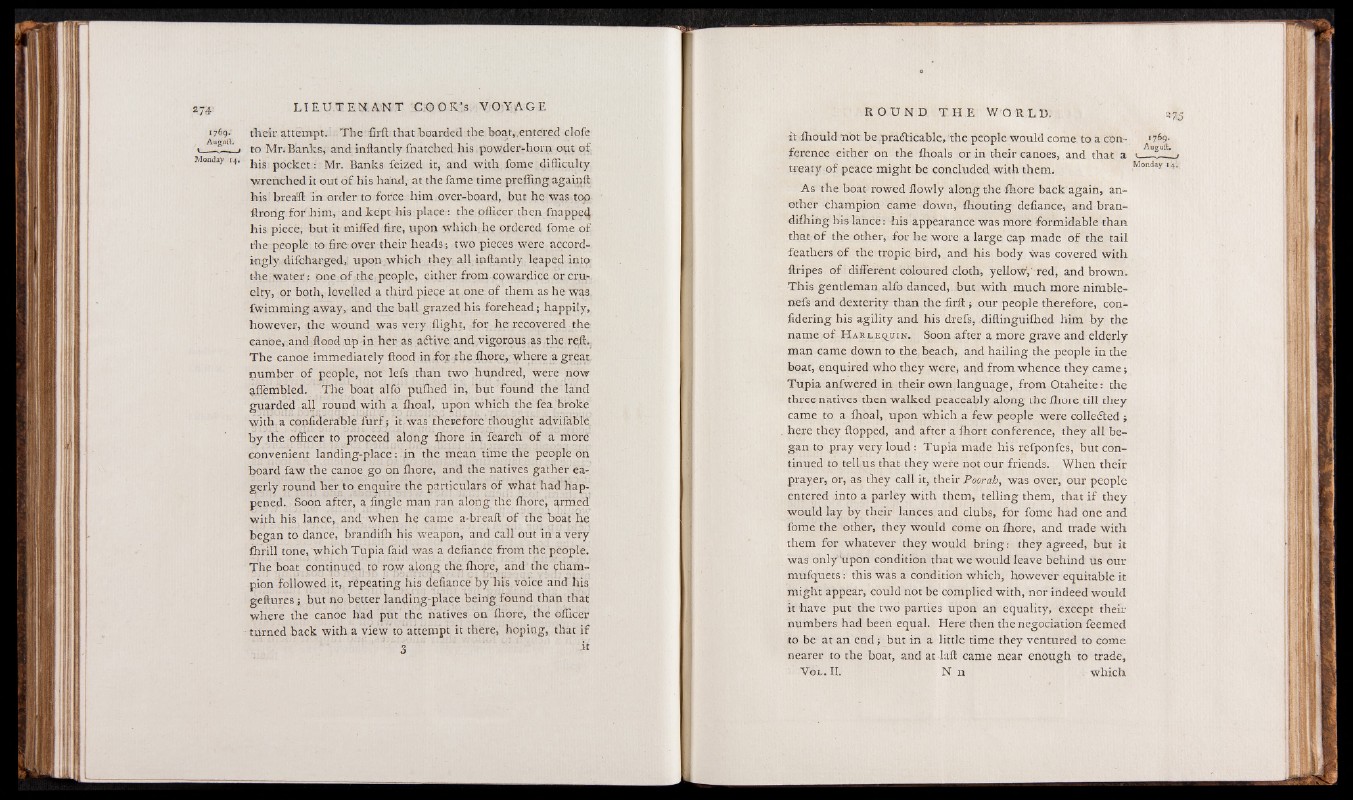
1769.' theirattem.pt. The firft that boarded the boat,.entered clofe
■ -S- ' . t-o Mr. Banks, and inftantly fnatched his powder-horn out of
Monday 14. j^js p0C]j.e t . jyjr Banks feized it, and with fome difficulty
wrenched it out o f his hand, at the fame time preffing again ft
his breaft in order to force him over-board, but he was top
ftrong for him, and kept his place: the officer then fnappecj
his piece, but it miffed fire, upon which he ordered fome of
the people to fire over their heads; two pieces were accordingly
difcharged, upon ,which they all inftantly; leaped into
the water : pne of the people, either from cowardice or cruelty,
or both, levelled a third piece at one of them as he was
fwimming away, and the ball grazed his forehead; happily,
however, the wound was very flight, for he recovered the
canoe, and flood up in her as active and vigorous as the reft.
The canoe immediately flood in for the fhore, where a great
number of people, not lefs than two hundred, were now
affembled. The boat alfo pufhed in, but found the land
guarded all round with a fhoal, upon which the fea broke
with a confiderable furf; it was therefore thought advifable
by the officer to proceed along fhore in fearch of a more
convenient landing-place: in the mean time the people on
board faw the canoe go on fhore, and the natives gather eagerly
round her to enquire the particulars of what had happened
Soon after, a Angle man ran along the fhorei armed
with his lance, and when he came a-breaft of the boat he
began to dance, brandifh his weapon, and call out in a very
fhrill tone, which Tupia faid was a defiance from the people.
The boat continued, to row along the. lhore, and the champion
followed it, repeating his defiance'by his voice aridhis
geftures ; but no better landing-place being found than that
where the canoe had put the natives on fhore, the officer
turned back with a view to attempt it there, hoping, that if
3 P
it fhould "not be practicable, the people would come to a con- *769-
ference either on the fhoals or in t-heir canoes, and that a ■ ■
treaty of peace might be concluded with them. Monday 14.
As the boat rowed flowly along the fhore back again, another
champion came down, fhouting defiance, and bran-
difhing his lance : his appearance was more -formidable than
that of the other, for he wore a large cap made of the tail
feathers of the tropic bird, and his body was covered with
ftripes of different coloured cloth, yellow, red, and brown.
This gentleman alfo danced, but with much more nimble-
nefs and dexterity than the firft ; our people therefore, con-
fidering his agility and his drefs, diftinguifhed him by the
name of H arlequin. Soon after a more grave and elderly
man came down to the beach, and hailing the people in the
boat, enquired who they were, and from whence they came ;
Tupia anfwered in their own language, from Otaheite : the
three natives then walked peaceably along the fhore till they
came to a fhoal, upon which a few people were collected ;
here they flopped, and after a ffiort conference, they all began
to pray very loud : Tupia made his refponfes, but continued
to tell us that they were not our friends. When their
prayer, or, as they call it, their Poorah, was over, our people
entered into a parley with them, telling them, that if they
would lay by their lances and clubs, for fome had one and
fome the other, they would come on fhore, and trade with
them for whatever they would bring : they agreed, but it
was only ftipon condition that we would leave behind us our
mufquets : this was a condition which, however equitable it
might appear, could not be complied with, nor indeed would
it have put the two parties upon an equality, except their
numbers had been equal. Here then the négociation feemed
to be at an end ; but in a little time they ventured to come
nearer to the boat, and at laft came near enough to trade,
V ol. II. N n which